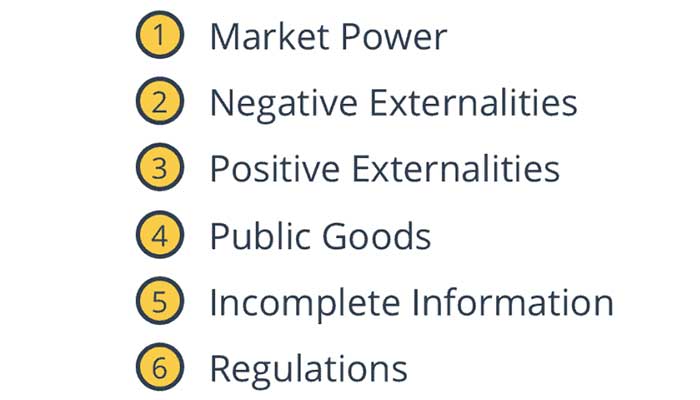
An economy never collapses by mistake, rather, it is the consequence of structural inefficiencies, policy errors, and systemic problems that build up over time. Economies collapse for a number of interrelated reasons, frequently a combination of external and internal causes. By breaking down these factors, we can comprehend why economies fail and use the lessons learned to avoid similar mistakes in the future.
1. Poor Governance and Political Uncertainty
Economic stability is threatened by political instability. Businesses find it difficult to prosper when a government is beset by corruption, incompetence, or a lack of accountability.
Inconsistent policymaking brought on by poor governance frequently deters both international and domestic investment.
For instance, nations with autocratic regimes or frequent changes in leadership typically place more importance on immediate political advantages than on long-term economic expansion. This undermines the predictability necessary for a robust economy and erodes investor trust.
Furthermore, corruption exacerbates wealth disparity and stifles innovation by transferring resources from productive use to a select few. The potential for economic progress is further crippled by misallocation of cash and a lack of openness.
2. Weak Rule of Law and Institutions
Strong institutions that enforce contracts, safeguard property rights, and maintain justice are essential to economies. Trust in the system declines when these institutions are weak. Companies are reluctant to make investments in areas with non-enforced contracts or where legal issues persist indefinitely due to broken processes.
Economic activity becomes uncertain in the absence of a strong rule of law which inhibits innovation and growth.
In nations with weak institutions, capital flight and tax evasion are commonplace, depriving governments of funds for infrastructure and public services. A vicious circle of under-development results from this.
3. Economic Policies that Are Ineffective
Economic policies that are poorly thought out can have a devastating effect on an economy. While policies that prioritize short-term advantages such as excessive borrowing or unsustainable subsidies might offer short-term respite, they frequently result in long-term issues.
Examples include currency crises brought on by inflated exchange rates, unmanageable debt loads from careless fiscal policies and hyperinflation brought on by uncontrolled money production.
Because they restrict competition and discourage innovation, protectionist trade policies also hurt economies. Industries that are protected from competition eventually lose their ability to compete globally and become inefficient which lowers economic production.
4. Over-Reliance On a Single Commodity or Industry
The secret to resiliency is economic diversification. External shocks can affect economies that rely significantly on a particular industry or product. For instance, when global oil prices decline, countries that rely heavily on oil have severe setbacks. In a similar vein, climate change and natural disasters might destroy economies that depend on agriculture.
By distributing economic activity over several sectors, diversification reduces these risks and makes sure that a downturn in one doesn’t result in a total collapse. Diversification, however, necessitates intentional legislative initiatives as well as expenditures on infrastructure, innovation, and education.
5. Social Inequalities and Income Inequality
Because it lowers total demand, high income disparity can cause economic instability. The majority of people lack the purchasing power to support economic growth when wealth is concentrated in the hands of a small number of people. A vicious cycle of low productivity, poor consumption, and high unemployment results from this.
By limiting the potential of significant portions of the population, social inequities including unequal access to opportunity, healthcare, and education make the issue worse. This weakens social cohesiveness and causes discontent over time which makes the economy even more unstable.
6. Outside Shocks
National economies are frequently and significantly impacted by world events. Overnight economic instability can be caused by trade wars, pandemics, financial crises, or geopolitical conflicts. For example, COVID-19 epidemic caused supply chain disruptions, decreased consumer spending, and compelled governments to take on enormous debt in order to provide for their people and enterprises.
Although external shocks are frequently inevitable, how they affect the economy relies on its readiness and resilience. Economies that are diversified have strong safety nets, and have good fiscal policies and are better equipped to withstand such storms than those that are already vulnerable.
7. Unmanageable Debt Amounts
When utilized responsibly, debt might be a helpful instrument, but taking on too much debt might cause the economy to collapse. Countries that take on more debt than they can pay back run the danger of defaulting which would damage their reputation and prevent them from accessing global financial markets.
Long-term growth is hampered by high debt levels since they take money away from necessary services to pay interest. Additionally, economies that depend on foreign debt are vulnerable to fluctuations in exchange rates. A sharp decline in currency value can significantly raise the cost of paying off foreign debt, sending the economy into a downward cycle.
8. Degradation of the Environment
Degradation of the environment is a frequently disregarded cause of economic failure. Deforestation, overfishing, and an over-reliance on fossil fuels are examples of unsustainable activities that deplete natural resources and endanger future economic opportunities.
These issues are made worse by climate change which results in more frequent natural disasters, lower agricultural production, and population displacement.
Long-term economic stability requires a shift to sustainable practices. This entails making investments in renewable energy, upholding environmental laws, and encouraging environmentally friendly technology.
9. Stagnation in Technology
Economies that don’t keep up with technology breakthroughs run the danger of slipping behind in the fast-paced world of today. Economic advancement is hampered by antiquated infrastructure, a lack of investment in research and development (R&D), and aversion to change. Productivity is decreased and global market competitiveness is restricted by technological stagnation.
To be relevant in the global economy, governments and corporations must embrace emerging technology, upskill their workers, and promote innovation. Economic development becomes unsustainable in the absence of such initiatives.
10. Subpar Development of Human Capital
The foundation of every flourishing economy is a workforce that is educated and skilled. When healthcare and education expenditures are neglected, the workforce becomes unproductive and unable to propel economic expansion.
It is difficult for nations with low literacy rates, weak healthcare systems, and inadequate vocational training to compete in the global economy.
Development of human capital necessitates significant financial outlays and sustained dedication. To ensure that everyone can participate to economic advancement, governments must concentrate on establishing fair access to high-quality healthcare and education.
11. Inability to Adjust to Worldwide Trends
Global economies are changing as a result of demographic shifts, technology, and globalization. Nations that don’t adjust to these developments run the danger of falling behind. For instance, countries adopting automation and artificial intelligence are able to outperform economies that rely on antiquated industrial techniques.
It takes innovative policies, investments in new sectors, and a willingness to work with people from different countries to adjust to global trends. Economic deterioration is accelerated by insular policies and resistance to change.
Avoiding Financial Failure
Even if there are many reasons why economies fail, they are not intractable. The following aspects must be given top priority by governments and policymakers.
- Strengthening Institutions
To promote stability and confidence, create institutions that are open, responsible, and effective.
- Diversifying the Economy
To reduce risks, lessen reliance on certain sectors or commodities. Ensuring fair access to opportunities and addressing economic inequality are key components of promoting inclusive growth.
- Investing in Human Capital
Give special attention to skill development, healthcare, and education.
- Adopting Sustainable Practices
Conserve natural resources and switch to eco-friendly technology.
- Embracing Innovation
Make R&D investments and adjust to new developments in technology.
- Preserving Fiscal Discipline
Steer clear of excessive borrowing and practice responsible debt management.
Economies might very well develop resilience, promote sustainable growth, and steer clear of challenging situations by confronting these issues head-on. Although economic success is not assured, countries might ensure a bright future by making conscious efforts.

Leave a Reply